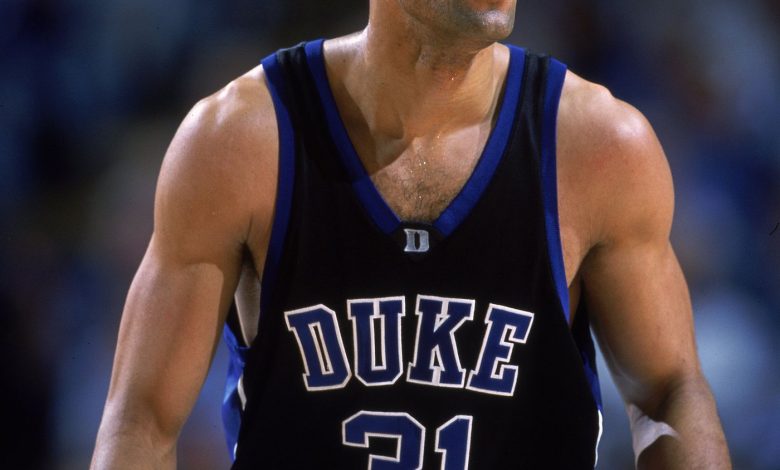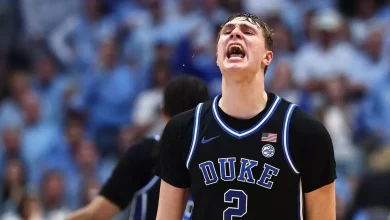Shane Battier: The Ultimate Student-Athlete and Defensive Anchor of Duke’s 2001 NCAA Championship Run

Shane Battier’s name is synonymous with excellence, both on the basketball court and in the classroom. His career at Duke University, spanning from 1998 to 2001, was one marked by a blend of skill, intellect, leadership, and an unmatched commitment to defense. A two-time First-Team All-ACC selection, a National Player of the Year, and the cornerstone of Duke’s 2001 NCAA Championship, Battier’s legacy continues to inspire basketball players and students alike. In addition to his basketball prowess, he was celebrated for his academic achievements, cementing his place as one of the most well-rounded student-athletes in college basketball history.
Born on September 9, 1978, in Detroit, Michigan, Shane Battier was raised in a family that valued both education and athletics. His parents, Ed and Anne Battier, encouraged him to excel in both areas, and he carried these values with him throughout his life. Battier attended Detroit Country Day School, where he quickly made a name for himself as one of the top high school basketball players in the country. His combination of basketball IQ, defensive ability, and leadership earned him recognition as a McDonald’s All-American, an honor given to the nation’s top high school seniors.
At Detroit Country Day, Battier led his team to three straight Michigan state championships, showcasing his versatility and leadership. He was known for his defensive prowess, but also his ability to score, rebound, and facilitate. His high school success was a precursor to the remarkable career that awaited him at Duke University.
Shane Battier arrived at Duke University in the fall of 1998, joining a program that had already established itself as one of the premier basketball programs in the country under the guidance of Coach Mike Krzyzewski. From the moment he stepped on campus, Battier’s combination of basketball IQ, humility, and work ethic stood out.
In his freshman season (1998-99), Battier quickly earned a starting role and demonstrated that he was more than just a defensive player. He averaged 13.6 points, 6.1 rebounds, 1.8 steals, and 1.7 blocks per game over his four-year career, statistics that reflected his all-around game. His defense was his calling card, but Battier proved to be a multifaceted player capable of contributing in all aspects of the game. As a freshman, he helped lead Duke to the Final Four, although the Blue Devils fell short of a championship that season.
By his sophomore year, Battier had become a key piece of Duke’s defense-first mentality. He earned the first of three consecutive NABC Defensive Player of the Year awards (1999-2001), a testament to his relentless commitment to shutting down opposing players. His defense was not just about stopping shots but about disrupting offenses, forcing turnovers, and instilling fear in the hearts of opponents. His role in Duke’s defense allowed his teammates to take risks and play with more freedom, knowing that Battier was behind them as a safety net.
The 2000-2001 season was a culmination of everything that Shane Battier had worked for during his time at Duke. It was his senior year, and he was determined to leave a legacy that would be remembered for years to come. Battier’s all-around game reached its peak that season, and he was named a Consensus First-Team All-American. His leadership and stellar performances on both ends of the floor were crucial to Duke’s dominance that season. Battier’s stats, which included 19.9 points, 7.3 rebounds, 1.4 steals, and 2.2 blocks per game, told only part of the story.
Battier’s incredible year was highlighted by several individual honors, most notably the Naismith College Player of the Year Award, the Associated Press Player of the Year Award, and the Sporting News Player of the Year Award, all of which cemented his status as one of the best players in college basketball. These accolades were a reflection of his all-around excellence and the pivotal role he played in Duke’s success that season. He also became the ACC Co-Player of the Year alongside Maryland’s Juan Dixon, further establishing himself as the league’s top player.
However, it wasn’t just Battier’s individual achievements that stood out. It was his ability to elevate his team. Duke’s 2001 team, often regarded as one of the greatest in college basketball history, finished the regular season with a 35-4 record. Under the leadership of Battier, the Blue Devils went on to win the NCAA Tournament, defeating Arizona 82-72 in the championship game.
In the Final Four, Battier’s play was nothing short of legendary. He was named the NCAA Final Four Most Outstanding Player, a testament to his clutch performances in the most crucial moments of the tournament. In the championship game, Battier finished with 15 points, 8 rebounds, and 2 blocks, and his defensive presence helped stifle Arizona’s offensive attack. The victory gave Duke its third NCAA championship under Coach Krzyzewski, and Battier’s contributions were central to the team’s success.
Shane Battier’s impact on defense is arguably his most lasting legacy. His defensive IQ and ability to guard multiple positions made him an invaluable asset to any team. At Duke, his ability to shut down opponents was legendary. Whether it was locking down the opposing team’s best scorer or guarding multiple positions, Battier’s defensive contributions were game-changing.
Over the course of his career, Battier won three consecutive NABC Defensive Player of the Year awards (1999-2001), which further cemented his reputation as one of the best defenders in college basketball history. His ability to read the game and anticipate the opposing offense’s moves set him apart from other players. He was often tasked with guarding the opposing team’s best player, and his unmatched ability to disrupt plays and create turnovers made him a nightmare for opponents.
Battier’s contributions to Duke’s defense helped the team establish one of the best defensive units in the country during his tenure. His leadership and defensive acumen were key factors in Duke’s dominance in the early 2000s.
Shane Battier was not just a basketball player; he was a student-athlete in the truest sense of the word. His commitment to academics was as strong as his commitment to basketball, and he excelled in both areas. Battier’s excellence in the classroom earned him numerous academic honors, including being named an Academic All-American of the Year in 2001. His ability to balance the rigors of a demanding basketball schedule with his academic responsibilities set him apart from many of his peers.
In addition to his academic achievements, Battier’s work ethic and character were widely praised by coaches, teammates, and professors alike. He was a model student-athlete, and his accomplishments on the court were matched by his accomplishments in the classroom. Battier’s success as a student-athlete continues to serve as an inspiration to young athletes who aspire to excel in both academics and athletics.
After leaving Duke, Shane Battier was selected by the Detroit Pistons with the sixth overall pick in the 2001 NBA Draft. His transition to the NBA was seamless, as he continued to excel as a defender while developing a reputation as a versatile player capable of contributing in multiple areas. Over the course of his 13-year NBA career, Battier played for the Pistons, Houston Rockets, and Miami Heat, winning two NBA championships with the Heat in 2012 and 2013.
However, it was his time at Duke that truly defined his career. Battier’s influence on college basketball, particularly his emphasis on defense and his ability to impact the game in so many ways, has had a lasting effect on the sport. His success at Duke has been a blueprint for future generations of players who aspire to blend academic excellence with athletic achievement.
Shane Battier’s career at Duke University remains one of the most accomplished and well-rounded in college basketball history. From his exceptional defensive play to his leadership on and off the court, Battier set a standard for what it means to be a student-athlete. His contributions to Duke’s 2001 NCAA Championship team will forever be remembered as one of the greatest individual and team performances in the history of college basketball.
Battier’s combination of athletic skill and academic excellence serves as an inspiration for young athletes everywhere. His career is a testament to the power of hard work, dedication, and the pursuit of excellence in every aspect of life. Whether on the basketball court or in the classroom, Shane Battier’s legacy continues to inspire and impact the world of sports.









